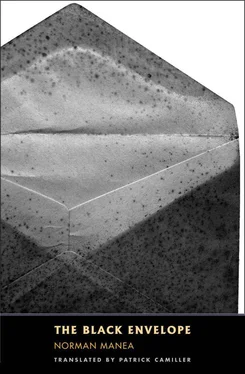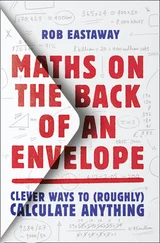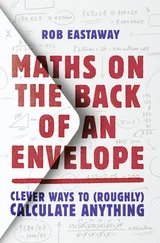Near his journey’s end, Mr. Dominic did indeed stop in front of the Scampolo store.
A surprise: the shop was open. Near the door a stocky flushed saleswoman was ruling her domain, with a long cigarette in her mouth. Mr. Dominic stayed in front of the window for a long time, feverishly looking at his watch. No, it wasn’t too early. Mrs. Venera would doubtless already be waiting for him. He excitedly fondled the old volume of Voltaire — a first edition — in his bag. He had decided against the routine flowers, believing that the rare tome would have a greater effect. But he could not make up his mind to set off: he looked now at the dust-covered window, now at the young South American woman with eyes far apart, broad nose, and thick, painted lips who was nonchalantly puffing and blowing in the crematorium’s thick black smoke.
So, dear lady, I was looking in the window to see who was following me. I had stopped in front of the Scampolo store, the one always closed for stock-taking. I kept staring in the window, as in a mirror, to see if anyone following me would appear; we all have that survival reflex, as you know, and with good reason. Who knows, maybe the emotion of Saturday evening was still having its effect on me. I was already on the stairs when I heard the yelping. That hoarse, smoldering bark, full of smothered abuse. I was about to turn back— maybe you needed help — about to defend you. Although you manage quite admirably, as I’ve seen; you know the model inside out. Nor is it surprising, after all that time you’ve lived together — you must be, as our friend Voltaire used to say, and in fact I’ve brought you a volume by that monster of intelligence, but that’s not what I wanted to say. As I was coming up the stairs again to your apartment, I was wondering how to dispel your mistrust. No, there’s no point in your protesting: why should we hide behind polite phrases? I’m frank to the point of imprudence, as you’ve been able to observe. Only with people who really interest me. That’s how I decided to be with you, right from the first moment. It’s strange: my frankness didn’t unblock you. These days, in fact, frankness arouses people’s suspicion. The age of suspicion , as Madame Sarraute said. I think you know her: she’s an elderly and perfectly honorable woman from an old nomadic family. She knows what she’s talking about. But she had no way of foreseeing the dimensions. I mean, she didn’t know that for us the formula is reality, our daily bread. That’s what I wanted to say. I hope that in our case, too, it’s only a question of this general suspicion which has got into our blood, understandably enough. It’s part of our metabolism. Why hide it? In other words, I hope it’s not a question of me personally, of some misinformation about me. When all is said and done, you know enough about me and my family, the philanthropic Marga, Sonia, the inhibited utopian Gafton. I don’t think you could be swayed by malicious gossip or foul mouths into giving me any less than my due. Nor would you be influenced by cheap slander, I hope. I know what’s said about people like me. That new recruit knew what she was doing when she asked me to prove my identity, to unbutton my trousers. I know what the talk is about people like me. Instead of being in an asylum or prison, or in a crematorium, here they are working in a hotel, making contacts with foreigners. Still today, when it’s forbidden to speak to a foreigner in the street, even if he asks you the time of day! That means I’m not allowed to talk to myself. Just imagine! But with you — because I no longer have anyone at all. I’ve decided to speak to you about that disgusting trial which cleared me out of teaching.
Or about the therapist Marga, who wants to cure me, do you hear? Without knowing that I don’t suffer from any illness. Because little Dr. Goody-Goody doesn’t know me at all, he just wants to get me between the legs of melancholy Irina, that’s what he wants. No doubt he knows about some things. But you burn there as at the heart of a volcano: you can no longer get out; the lava pulls you deeper and deeper. Excuse my language, dear lady, I know what I’m saying. They all drag you down into the bottomless pit, and you like it and you can no longer escape, in saecula saeculorum you can’t escape. You know it, surely you know the fabulous grotto of Hymen-land, that magnificent abyss of reintegration.
I want to speak to you about that disgusting trial, from which Goody-Goody Marga saved me, I have to admit. I feel dutybound to tell you about that dirty frame-up. You are too precious for me: I cannot give up these hours of rare communication and communion. Everything you permitted me on Saturday seemed like a grand prologue, but it might also be a confused finale, a sudden stopping short. I couldn’t bear it to be an adio . I’ll tell you about the darkest region of love, for which we run around with our tongue out, as you so well put it, my dear little Venera of Theresienstadt.
You see, my dear friend, frankness arouses suspicion. But if you go where you have never had the courage to go, it’s impossible that you won’t break down the reticence. Where the vulnerability is absolute, the truth is simple and childlike and tender and unadorned.
I’m talking about a unique moment, a unique risk, after which we remain troubled and burdened, as I well know. I may throw the burden down the drain at some point, or I may feed it with the bafflement of a soul wounded forever, or I may use it sometime as an abject weapon, but there can no longer be suspicion, no, suspicion there can no longer be.
Truly free communication. Naïve, godly, without defenses, full and pure, my dear puppy. Only then do we become capable of understanding the souls of our friends, of our friends’ friends, however strange they may be. We will then be able to speak, for the first time frankly, about the absent ghost who has left his mark on us both. Those were the anxieties I had as I climbed the stairs, my dear friend, step by step toward this special place of refuge.
Mr. Dominic slowly counted the steps. He reached the second floor, the light switch. The filament flickered and immediately went out, but the bell was working. Mrs. Venera moved with difficulty this time, no doubt busy in the kitchen or reading a book or attending to the hygiene of watchdog Tavi. Teenager Dominic took the liberty of ringing again. Nothing stirred. As if Tavi had also gone deaf, perhaps, or they were sleeping like a log — maybe smitten with love for each other, the glorious silent-film couple Tavi and Tereza of Theresienstadt, fast asleep in their love’s impenetrable armor of Krupp steel, Sieg Heil . He rang again, then several times in quick succession. He went downstairs and waited a little in front of the block. Then up again to the bell. Nobody, not a sound.
In the dim light of the corridor he now distinguished a note stuck to the door. He felt for the matches in his pocket. Dominic did not smoke, but he always had a box of matches on him. What with the energy crisis, you can find yourself at any time in need of the ancestral fire. A small sheet of paper from a notebook was fastened to the apartment door with a pretty little red Chinese pin. He stood closer and bent forward to decipher the tiny writing: Away on holiday .
Such notices were common enough on the doors of shops, dispensaries, post offices, everywhere. Not open due to a meeting. Shut for stock-taking. Closed due to management illness. Stocktaking. Meeting. Away on holiday. But in this case the handwritten note caused alarm. Tiny, delicate, barely legible, like a line from a letter — a feminine letter, concise, coded. He read it once more, rang once more. He went down the stairs, back up, down again. He waited in front of the building, climbed the stairs again, lit some more matches, read and reread the note. So this was it. Silence, nothingness.
Читать дальше












